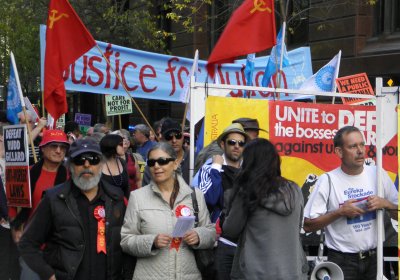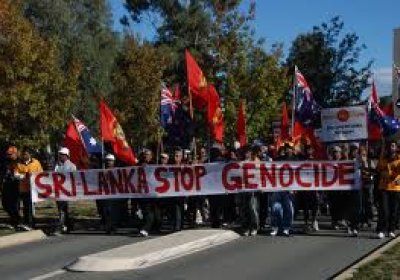The National Tertiary Education Union (NTEU) at the University of Sydney is involved in an industrial battle with the administration over pay, conditions and casualisation.
As part of this campaign, the union held a 24-hour strike on March 6. Staff and students held pickets outside all campus entrances, and the university was largely shut down for the day.
The multiple picket lines converged on the main entrance to the university for a midday rally, which attracted hundreds of staff and supporters. There were many speakers including unionists, student representatives and the Greens.
Australia
A protest was held outside the Department of Foreign Affairs and Trade in Sydney on March 19, to oppose the controversial state visit by the Myanmar president Thein Sein.
Prime Minister Julia Gillard met with Thein and announced a $20 million two-year aid program, as well as the posting of a resident military attache and a trade commissioner in Yangon.
Protesters representing the Rohingya, Karen and Kachin communities demanded the Australian government address the gross human rights abuses before business and military deals are made.
Photos by Peter Boyle.
Do oil spills make good economic sense? A witness called by Canadian firm Enbridge Inc— which wants approval to build a $6.5 billion pipeline linking Alberta’s tar sands with the Pacific coast — told a recent hearing in British Columbia that the answer is yes.
Over the past year, we have seen a huge rise in activity around women’s rights in Australia and other parts of the world.
Attention has turned to a range of horrific individual tragedies as well as broader issues, including sexual assault and violence against women, the disparity in income between men and women, and a debate about misogyny.
Although the idea that feminism is no longer relevant still dominates, women know through experience that sexism is rife. They are learning to organise together and taking to the streets in large numbers to demand change.
When coal seam gas company Metgasco announced on March 13 it had suspended its operations in northern NSW after a long community campaign against it, it was just the latest in a series of setbacks for the CSG industry.
It followed the suspension of an AGL project in Campbelltown in western Sydney after community protests. Another company, Arrow Energy, has withdrawn from NSW and wants to transfer its licence to Dart Energy so it can focus on expanding in central Queensland.
There are at least two truisms in Aboriginal affairs. The first is that the more things change, the more they stay the same. I’ll come back to that one. The second is that the road through Aboriginal affairs, while often paved with good intentions, is sometimes paved with bad ones.
I’m going to assume that when Minister for Indigenous Affairs, Jenny Macklin held a gun to the head of Alice Springs town campers and told them that unless they signed over their land for 40 years it would be compulsorily acquired, that her intentions were good.
This letter was read out to 300 people who rallied in Campbelltown, NSW on March 17 to protest against coal seam gas (CSG) expansion in the area.
***
Good afternoon all. My name is Debbi Orr and I live in the Tara Estates — a gas field in Queensland.
Since CSG invaded our area, all of my six children have become sick. Headaches, nosebleeds, burning itchy eyes are a regular — sometimes daily — occurrence in our house.
A landmark ruling in Sydney on February 15 gave the biotechnology industry an unprecedented right to make huge profits from genetic testing.
The case involved the breast cancer genes BRCA 1 and BRCA 2 and the right of US biotechnology company Myriad Genetics to have exclusive licence to a patent over their use in research.
Federal Court Justice John Nicholas had ruled that a private company can continue to hold a patent over an isolated gene, in this case, the BRCA gene. The BRCA gene is responsible for repairing or removing defective DNA cells.
The abortive leadership spill in the Labor party on March 22 was yet another demonstration of its total political bankruptcy.
Kevin Rudd's leadership ambitions may now be in the dustbin of history but Prime Minister Julia Gillard has won a pyrrhic victory.
The public watched this gross display of principle-free power play in disgust. It seemed to make a government led by Liberal leader Tony Abbott a virtual certainty.
Having tried absolutely everything they could think of to win the support of voters besides push good polices in favour of working people, there was really nothing for Labor's parliamentary caucus to do except launch yet another leadership spill on March 21.
It might have been a farce that will help worsen Labor's defeat in September, but it did reveal one startling fact: Simon Crean is still in parliament. I know, right?
About 200 people attended a community forum on March 19 to discuss the future of policing at the Sydney Gay and Lesbian Mardi Gras parade. It was organised in response to community outrage over violent arrests at this year's parade.
The forum was called by the Sydney Gay and Lesbian Mardi Gras, the AIDS Council of NSW, Gay & Lesbian Rights Lobby, Inner City Legal Centre, NSW Police and independent MLC Alex Greenwich.
Hundreds of people rallied outside parliament house in Canberra on March 13 to demand action for the war crimes of Sri Lankan President, Mahinda Rajapaksa.
The rally was organised by Campaign for Tamil Justice, who are calling for an independent investigation into allegations by a UN panel of Sri Lankan military war crimes and crimes against humanity.
Campaign spokesperson Trevor Grant said: “The UN Human Rights Commission is meeting right now on Sri Lanka and the word is that there will be another insipid resolution issued, with support from Australia.
- Previous page
- Page 664
- Next page










